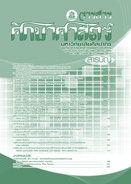การพัฒนารูปแบบการสอนเพื่อพัฒนาจิตวิจัย สำหรับนิสิตระดับปริญญาตรี สาขาเทคโนโลยีการศึกษา
Main Article Content
บทคัดย่อ
1. รูปแบบการสอนเพื่อพัฒนาจิตวิจัย สำหรับนิสิตระดับปริญญาตรี สาขาเทคโนโลยีการศึกษา มีชื่อเรียกว่า “MER” มาจากกระบวนการวิจัยทั้ง 3 ระยะ คือ ระยะที่ 1 เปิดใจรับ (Opening up mind) ระยะที่ 2 ซึมซับประสบการณ์ (Providing direct experience) และระยะที่ 3 สานสร้างจิตวิจัย (Research mind nurturing)
2. ค่าเฉลี่ยคะแนนของคะแนนที่เกิดขึ้นระหว่างการใช้รูปแบบการสอนด้วยกระบวนการวิจัยเชิงปฏิบัติการ (Action Research) มีแนวโน้มของพัฒนาการจิตวิจัยของผู้เรียนสูงขึ้น โดยพิจารณาจากผลคะแนนจากรูปแบบการสอน ระยะที่ 1 เปิดใจรับ (Opening up mind) จำนวน 4 ครั้ง มีความแตกต่างกันอย่างมีนัยสำคัญทางสถิติที่ระดับ .05 และระยะที่ 3 สานสร้างจิตวิจัย (Research mind nurturing) จำนวน 2 ครั้ง มีความแตกต่างกันอย่างมีนัยสำคัญทางสถิติที่ระดับ .01
3. ระดับความพึงพอใจของนิสิตที่เรียนจากรูปแบบการสอนฯ พบว่า นิสิตมีความพึงพอใจต่อรูปแบบการสอนที่พัฒนาขึ้นในระดับมากโดยมีคะแนนเฉลี่ยเท่ากับ 4.20
A Development of an Instructional Model to Develop the Research Mind for Undergraduate Students in Educational Technology Major
The purposed of the study was to develop an instructional model for developing research mind of educational technology undergraduate students. The research process comprised of three phases. The first phase was on constructing the instructional model; it began with content analysis of documents in order to create instructional model prototype, then validation the validity and reliability of model with 5 experts. The second phase was implementing the developed instructional model with 3rd year undergraduate in educational technology program. The implementation was done in the second semester of the 2012, academic years. The third phase was about evaluating the efficiency of the model and evaluation students’ satisfaction. The model’s efficiency evaluation was done through focus group discussion of 9 experts with the average at 4.16. Student satisfaction evaluation was done through the use of questionnaires. Results of the study, it was found that;
1. The developed model was called “MER” featuring of 3 stages of activity, stage 1; opening up mind, stage 2; providing direct experience and stage 3; research mind nurturing.
2. There is a tendency of research mind development during teaching with the “MER” model considered from the scores of stage 1 “opening up mind” with a statistical significant difference at .05 level, and also the scores of stage 3; “research mind nurturing” with a statistical significant difference at .01 level.
3. Students had high satisfaction forwards the “MER” model with the average at 4.20


